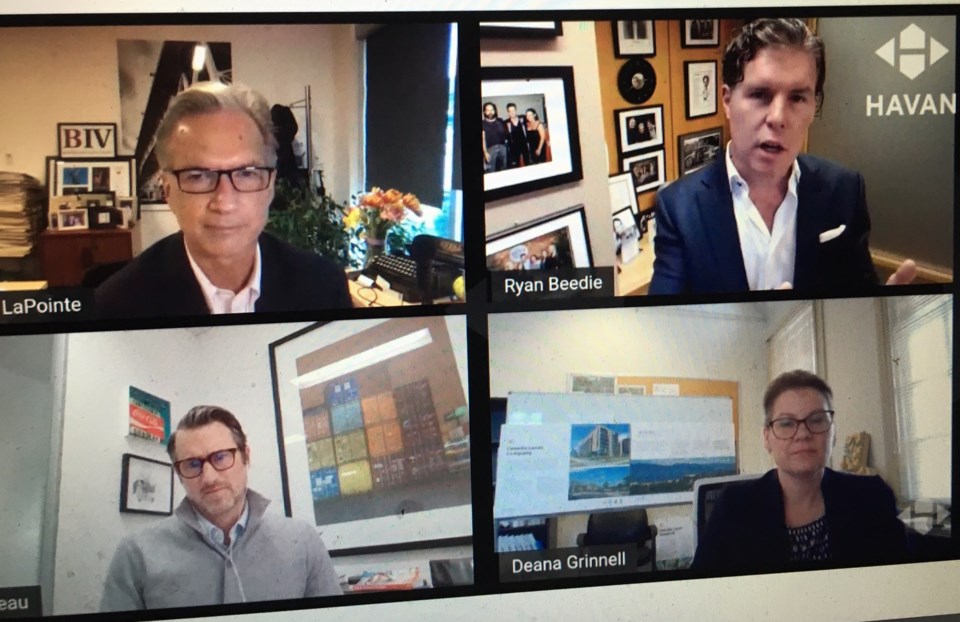Getting the community onside was a central theme when three legendary real estate developers gathered February 10 for the 19th annual HAVAN Legends of Real Estate event, moderated by Kirk LaPointe, publisher and editor in chief, Business in Vancouver and vice-president, editorial, Glacier Media, and the first ever held online.
The tenet of gaining the trust of residents, First Nations and local governments underscored discussions about the past, the present and, most notably, the future of real estate development in Metro Vancouver.
When asked to share defining moments in their careers, two of the speakers at the virtual event pointed to times when gaining the confidence of the community was the key to moving a project forward. The third, Ryan Beedie, president of Beedie Development, recalled the successful opening of his first industrial project and the satisfaction he felt delivering jobs and investment into a supportive Delta neighbourhood.
Beau Jarvis, president of Wesgroup and chair of the Urban Development Institute, Vancouver, told the online audience that development can be stalled, even stopped, by community opposition. Kitchen-table talks with concerned neighbours, he said, can be as important as any boardroom meeting when it comes to moving a development from concept to construction.
Deana Grinnell, vice-president, real estate in B.C. and Ontario with Canada Lands Company, has been steeped in community engagement for years. She is involved now in perhaps her most challenging and complex mediations, regarding the master planned development of both the Jericho Lands and the Heather Street Lands in Vancouver. These high-profile projects involve not only deeply- engaged communities, but also three levels of government and the Musqueam, Squamish and Tsleil-Waututh Nations.
Working with First Nations, Grinnell said, is a template for reaching conciliation with the wider community.
Being humble is good first step, she suggested.
“It is about educating yourself,” Grinnell said, “You can’t expect First Nations to educate you. You can’t arrive in room and say ‘we are going to business as long as you do it my way.’ That won’t work at all.”
Jarvis and Beedie believe the real estate industry has made giant improvements in community engagement over the past few years, but agreed more can be done.
Jarvis noted, however, that the sheer complexity and prolific growth in Metro region real estate has resulted in a “mass” of often overlapping and competing policies from all levels of government related to social issues, density, the environment and climate change, especially in the new residential sector.
“There is no prioritization of policies,” Jarvis said. This leads to development delays, ballooning costs – and directly to the current housing shortage and affordability crisis, he said.
“Every government platform is housing, housing, housing but we are not seeing an outcome,” Jarvis said. “And I don’t see that changing.”
Beedie, citing an example where it took two years to receive permits for a simple industrial building, agreed unnecessary delays can drive prices higher.
“Instead of competing projects coming to the market [at the same time] only one is approved and so the demand pushes prices up,” he explained.
Beedie also cautioned that, in the commercial real estate field, long delays can be a drag on the economy, because national companies who need new space, and employees, will look outside of Metro Vancouver.
Looking to the future, the panel called for cooperative and innovative thinking to match a restrictive land base with the explosive Metro population growth over the next decades.
“We have no greenfield sites left, it is all infill from now on,” Jarvis said, adding the only answer is “intensification.”
Grinnell urged political leadership to create regional hubs that provide a “15-minute community” with homes, jobs, shopping and services all within reach, rather than a continual expansion of land-gobbling transit lines and freeways across the region.
Beedie pointed to specific examples of how infill development could take place, providing there was a political and community buy-in. He cited Vancouver’s Pacific National Exhibition site, where acres of parking lots sit vacant, he estimated, for 95 per cent of the year. “That land could be purposed for housing or to create employment,” he said.
“There is going to have to be leadership, and some people will be upset, but, if we don’t address issues around density, affordability will just get worse,” Beedie said.
Sponsors
The Legends of Real Estate was presented by the Homebuilders Association Vancouver (HAVAN), and sponsored by FortisBC , National Home Warranty -AVIVA and Federated Insurance. The media sponsor is Glacier Media Group and Business in Vancouver.



